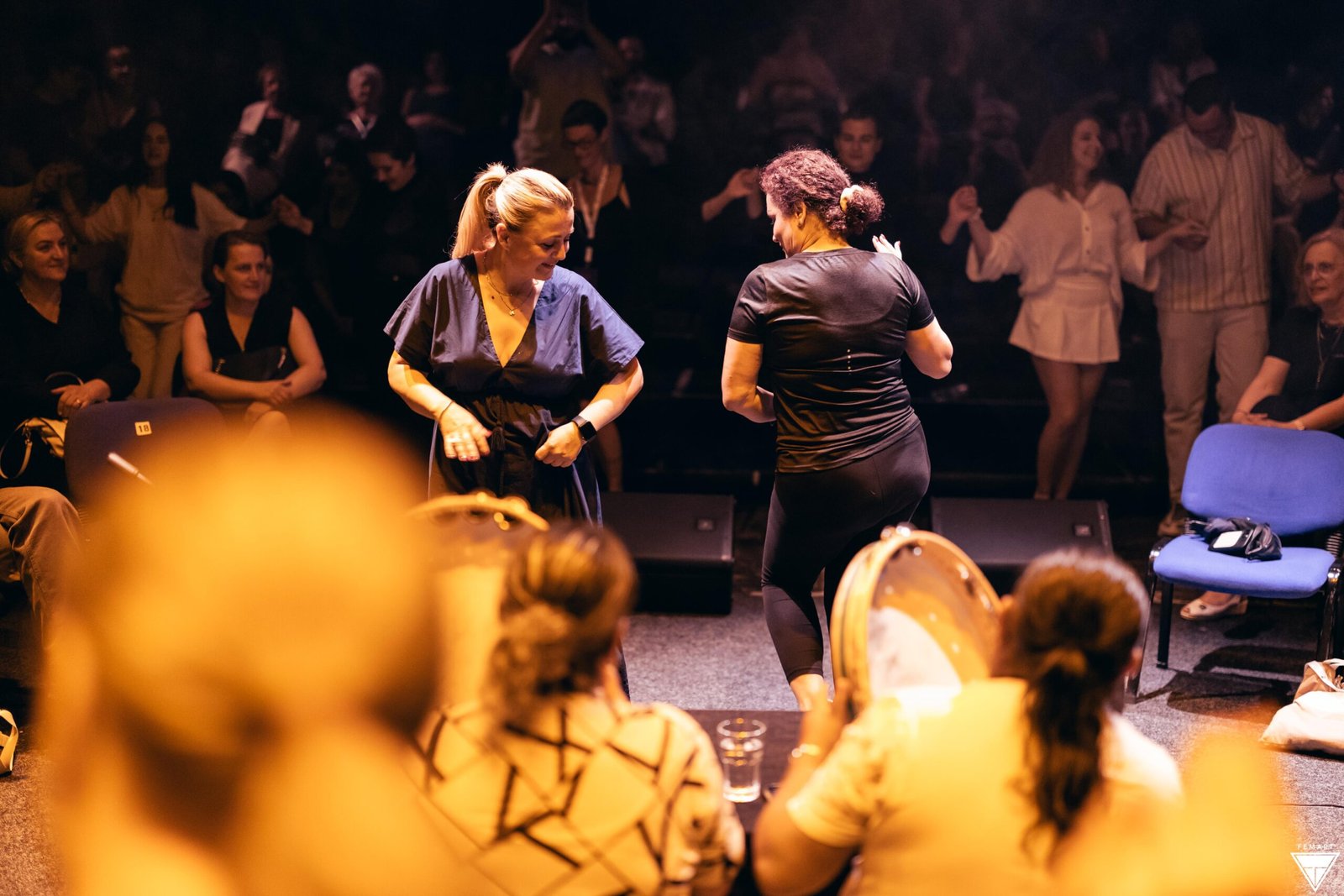By: Gili Hoxhaj
When the performance “Marrja Zezë” ended at Oda Theater, Shpejtim Smaqi and Sabahete Hasani were waiting by the hall door, each holding two drums. They were the next performers on the program. As the audience exited, they slipped in quietly, trying not to be noticed, aiming to get accustomed to the theater stage for the first time in their lives. Slightly shy and hesitant. I don’t believe they had ever performed before in front of such a diverse audience made up of people from different countries, faiths, and backgrounds—people who advocate against gender and social inequalities. They didn’t understand the language, but later it became clear they embraced the rhythm.
The duo has spent their lives simply trying to entertain others. Last night, they succeeded. “Your enjoyment is what brings us joy”, Shpejtim Smaqi told me in a brief conversation. Elira from Artpolis had to meet them in Gjakova to convince them to come to the festival. She took care of every detail to make sure they felt comfortable. She arranged their taxi and hotel, based on the agreement they had reached. On a black table, they had placed water, and when the audience surrounded them with chairs, they began the song.
These were songs I often heard as a child. Wedding songs. Songs with which my mother, grandmother, and relatives got married. Last summer, even my brother and my friend. “Me na bo shyhret” (To set the atmosphere for us) was all they asked for through the song. The festival organizer, Zana Hoxha, came out first with her colleague, Venera Ismaili. And just like that, their hands and the performers’ hands were freed when the hall was filled with dance to their music. They sang everyone’s name who came out to the stage, and laughter filled the room. They didn’t miss a name whispered in the ear, despite the noise.
“Hands That Burn, Hearts That Liberate” was the title of the third night at FemArt—a completely unusual evening, but like a liberating celebration, where everyone knows exactly how to dance. Artist Anisa Ismaili also returned to this nostalgia and enjoyed it. “The foreign artists who were present asked us how it is possible that you all know how to dance?… Well, tradition is not easily forgotten, and we happily preserve it,” said the actress and producer, Anisa Ismaili.
According to her, it is important that this side of the tradition is also shown at the festival.
“A very different night at FemArt. The duo electrified the stage and honestly, even us in the audience. It’s beautiful that this part of our tradition is shown at the festival,” she emphasized. It seems no one remained without dancing, whether seated or standing. Chiara Bosco from Italy did not stop dancing for a moment, together with her friends.
“There are drums and songs and many beautiful women dancing in a circle… it feels like a pagan ritual I belong to. Simply amazing,” she told me as the song continued without pause.
This pleased the performers who smiled warmly at those dancing. It was as if their effort was being rewarded. They even received a new invitation to perform at “EtnoFest.” Shpejtim and Sabahete are good friends and members of one family. Shpejtim has been doing this work for a long time.
“I started when I was 13, now I’m 48. I like making everyone happy,” Shpejtim said, as sweat was visible on his face. He said they are happy to be part of people’s joys only, and this hope is born anew every day.
“We are only for good. Like when I wake up in the morning, I say ‘O Allah, if only someone would get married so I could go sing, haha…’” he continued laughing for a while. I laughed too. Later, I received some comments on this event I had posted—some very positive, and among them, someone surprised. It doesn’t matter much. This was a night that freed us and connected us with memories. It made us hold each other’s hands and laugh wholeheartedly while dancing. We never laughed more at any other evening.

